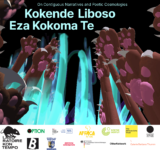
The excerpt below, from Awes A. Osman’s novel Skinless Goat in Somalia, is part of #100daysofafricanreads (curated by @SisterKilljoy). The book was inspired by Awes Osman’s student days in India and centres on the story of an Indian girl and a Somali boy; the repercussions of their romance and the Somali and Indian mindset vis-à-vis the relationship.
In this short excerpt, the first part relates a journey by train, undertaken by Omar, who, while on the run with his girlfriend, is wondering how his parents will react to the fact that he came all the way from Somalia to get a university degree in India and ended up returning with a fair and beautiful Indian girl called Sunita. The second part focuses on Jama’s fear of how he might have inadvertently endangered his sister’s life by helping friends as he goes home to make sure she is ok. The final part sheds more light on past events and introduces Osman Hamari, President of the Somali Students Association.
In the coming weeks, we will feature Awes A. Osman in conversation with one of our editors, and he will discuss displacement, ethnic violence and literature among other issues.
XV
As the train traveled at a high speed, Omar started enjoying the atmosphere. He stretched his right hand and the breeze went through his fingers and he enjoyed it. He was sitting in a coach at the window side with Ali next to him while Sunita sat in front of him. The compartment was divided into coaches with each one having seats. There was an old lady with a small girl, two Indian gentlemen in the same coach with Omar’s group. The train bid farewell to Jabalpur and its messy situation and hit the long journey to Pune. Omar was all smiles. Silence was everywhere except for the two young gentlemen who enjoyed a friendly chat. The train passed different places which made the Somali passengers quite awestruck. It passed an open dry desert-like area with small green grass and it passed through a tunnel to huge rocks and mountains which seemed to be designed so as to reflect the beauty of nature. When the train approached a small shantytown, it came to a stop at a station. Many vendors sold peanuts and soft drinks. The two young Indians got down from the train to take a break. Omar bought three bottles of soft drinks from the window. His favorite drink, which was milk, for himself and two colas for Ali and Sunita. No sooner had they paid for the drinks, that the whistle of departure was again heard and the train slowly moved. The fortunate residents of the town occupied the shanty huts as many others made their bedrooms just a few meters from the railroads. Everything they had inside their house was apparent to the passengers. There were other smaller huts with very narrow doors that made one wonder how the residents entered these huts. There was a small boy outside one of the huts. The boy, who was on bare feet, knelt down to defecate and in front of him was a small girl with mud on her fingers. They were happily playing together. A lady was taking a nap on a carpet-like sheet near the children. She was probably resting after a tiring morning, searching for the day’s bread. Also, another lady sat on a stool and combed the hair of a small girl. No sign of discontent on their faces as the train moved. Shanties of similar status and families became visible. The wind started blowing, giving the residents of the town a chill to make them feel at peace with nature. Omar let his fingers feel the fresh air.
He watched the girl sitting in front of him. He looked at her beautiful eyes. They reflected innocence, honesty and courage. All in one. Three in one person. She abandoned her family, house, education, society and everything Indian for his sake. For the sake of his love. Through the same eyes, he saw himself. There he was, well dressed and elegant on his way to an unknown destination. He came all the way from Africa to get a university degree and ended up returning with a fair and beautiful girl. What a victory, his parents should be happier. If he presented them with Sunita instead of one hard page of a degree. Anyway, there was not much knowledge he would gain from an Indian professor like Mukherji’s. The train slowed down and stopped at another station. Another team of vendors came near the windows with drinks and eatables. Smokers went out briefly to have a smoke. Omar stood up and came out of the train to take a look. There were groups of people around. Children in a begging operation led by an old blind man. The old man sung a good song while the children also sang in a beautiful chorus. It was a pity that only two passengers felt pity and gave them alms. The whistle was again heard and the begging group hurried out of the train. When Omar went back to his seat, he made sure that Sunita was enjoying the trip. Through the window, he watched the cows and goats grazing. He thought of their life and experiences. Did they have any problems? Did they worry? Animals! They live and die easily. No psychological problems, among them. There is no law and governments, no discrimination, no black and white, no minority and majority, no language barriers or religious differences. Interestingly no jealousy, no inferiority complex. No, Omar swerved his thinking direction. Since no human being ever had the chance to belong to the animal race and get transferred to human status. It would be hard to imagine exactly how animal society operates. All the observations that shed light on the internal life of animals are probably not based on concrete proof but fables. Is it not the fox that enjoyed the position of the wisest of all animals while lion claimed the dictatorial empire under him? How did they manage to achieve these titles without policy and strategy of understanding? While Omar was enjoying the reverie, Ali looked at the two young gentlemen sitting next to him and one of them was reading a newspaper. His eyes caught a news headline which gave him a shiver. … AFRICAN STUDENT KILLED IN A FIGHT…… He requested the gentleman to let him read and passed it to Omar and Sunita. Ali gave back the paper with thanks. The story covered the murder of the Ethiopian student in detail. As the news reached the media, the problem became public and made things difficult for Omar in his adventure to realize his dream.
Jama escorted his friends to the railway station. He waited till the train departed and waved a sorrowful goodbye. He took a rickshaw and headed back to Napier town. Even though he was bravely helping his friends to leave Jabalpur safely, he felt insecure. Never did he nor his sister encounter any problem since they began to stay in Napier town. The grocery shopkeeper, the vegetable man, and the butcher shop owner as well as the baker around the city knew them well and trusted him a great deal. Omar, Ali, AbulRazak and AbdulSalam had all left and they had left with an Indian girl, daughter of a well-known professor. This would definitely provoke anger among the residents of the neighborhood. How could he and his sister protect themselves, should they be attacked by the goondhas? He started feeling uneasy and wondered if he was being followed. All the neighbors and residents of Napier town were aware that a Somali boy lived there with his sister. Would it not be easy for the gang to locate the house and kill them? Fear filled his being and he asked the rickshaw puller to hurry up. Oh God! What safety had he provided for his sister while he was trying to rescue his friends, he thought? What if they had already reached the house and were beating up his sister? “No, I will not permit this to happen to Sahro. I will kill all of them should they even touch her.” The rickshaw pulled up in front of the house and Jama jumped out and ran away. The puller shouted after him for the payment. He returned and threw some amount and did not know how much he had paid.
He knocked at the door and waited for his sister. When there was no response, he opened the door and went inside. His sister normally eagerly opened the door for him even though she knew he had the keys with him. She used to open up and start telling him the news of the day even before he came in, always joking and laughing. He now started missing it. Sweat started draining down his body, as he suspected that things were not normal. He could hardly breathe without difficulty when he saw bloodstains on the ground at the entrance of the room. It was Sahro’s bedroom. His mouth went dry. His eyes followed the bloodstains to the room. It led him to the butcher’s desk. He followed it to the bed where Sahro’s body lay. There were three knife stabs on her. One on the chest, the other on the stomach and third on the shoulder. She might have struggled to escape. She bled to death. Jama started wailing aloud but something from behind him stopped him. A hard blow threw him on the floor and a stab slid his chest open and blood flowed out of it. Jama fell on top of his sister mixing his blood with hers. The killer, a top gunman in Krishna’s group, believed strongly that he was not only doing an assignment but also a sacred religious duty. He repeatedly plunged the knife into Jama’s body until he died. His partner who was watching the action nodded with excitement. The killer took out a handkerchief and wiped the sweat from his face. He cleaned the blood from the knife with a small rug that his partner took out from his pocket. They both jointly dipped their fingers in the blood and with it marked on the wall in big words of “JAI HIND”.
XVI
Osman Hamari had been staying in Jabalpur for many years. He was elected President of the Somali Students Association, as a president without portfolio for no Somali student recognized him as the president. It was created two years ago just because all the other foreign students belonged to their own Association. There was an annual meeting among the foreign students from all countries. When he was offered the post of ‘President’, he did a lot to unite the few Somali students scattered all over Jabalpur. He encouraged weekly meetings among them and had good connections with the Somali Embassy based in New Delhi. He led a delegation to New Delhi to discuss with the embassy officials when the University of Jabalpur required attestation of the Somali HSC certificates and no-objection letter from the embassy, and the embassy promised to provide it subject to payment for the same. Osman and his team were able to sit with the ambassador and settle the issue. For the Somali students living in Jabalpur, they got the attestation and recommendation letter free of cost. Since then, he enjoyed recognition and respect among all those who heard of the great achievement. Osman stayed in an apartment with three Somali students near the police ground where the football tournament among foreign students was held. He heard about Omar’s love affair with an Indian girl. He also learnt that the affair was the cause of the violence in the city. He was informed by a friend in strict confidentiality not to disclose it to anybody else. He also heard about Omar’s elopement with Sunita…
Awes Ahmed Osman was born and raised in Somalia, and educated in India & Somalia.
Prior to arriving in Sweden, he worked extensively in the UAE, Saudi Arabia, and Somalia. His novel, Skinless Goat in Somalia has been translated into Swedish (denskinnlösageten I Somalia) and he is now working on a new book. Awes currently works as a teacher/trainer at FolkhögskolaNyköping. He is highly interested in helping newly-arrived refugees integrate Swedish society and, for this reason, coaches immigrants in Stockholm. He speaks four languages fluently and can be reached on awesosman@hotmail.com
[Book Excerpt] Skinless Goat in Somalia by Awes A. Osman

Share This
Previous Article
[Night Life] Yshaper Presents Playlist
Next Article





